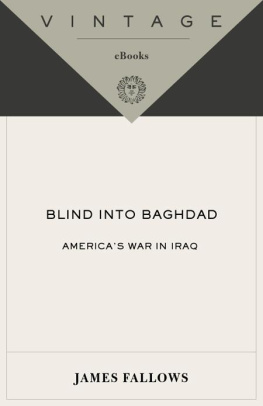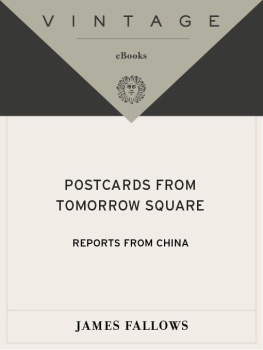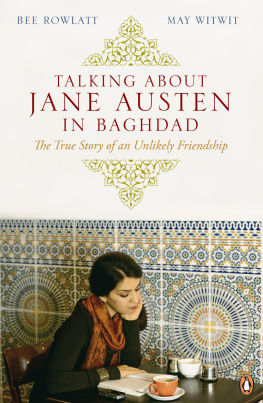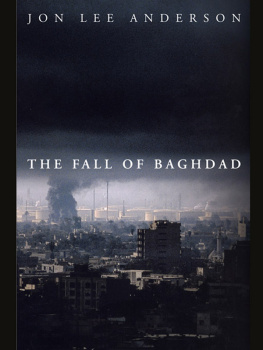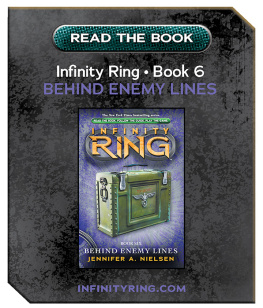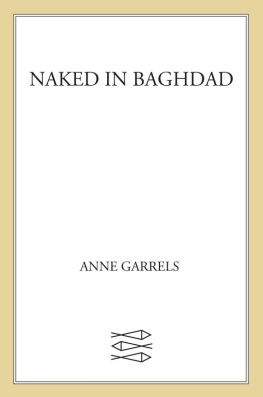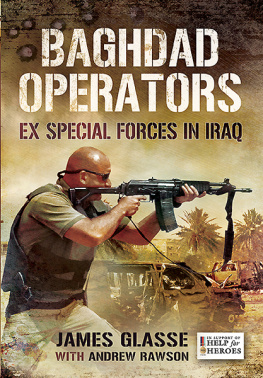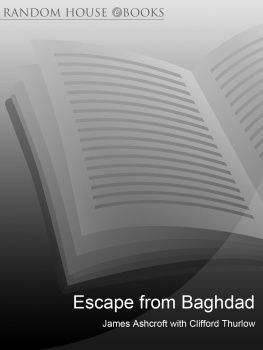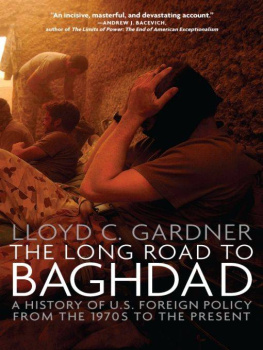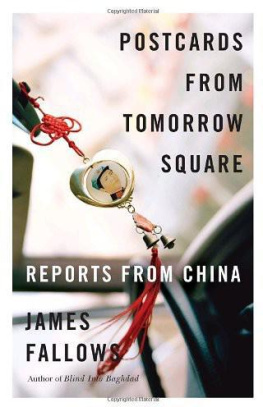James Fallows - Blind Into Baghdad: Americas War in Iraq
Here you can read online James Fallows - Blind Into Baghdad: Americas War in Iraq full text of the book (entire story) in english for free. Download pdf and epub, get meaning, cover and reviews about this ebook. year: 2006, publisher: Vintage, genre: Politics. Description of the work, (preface) as well as reviews are available. Best literature library LitArk.com created for fans of good reading and offers a wide selection of genres:
Romance novel
Science fiction
Adventure
Detective
Science
History
Home and family
Prose
Art
Politics
Computer
Non-fiction
Religion
Business
Children
Humor
Choose a favorite category and find really read worthwhile books. Enjoy immersion in the world of imagination, feel the emotions of the characters or learn something new for yourself, make an fascinating discovery.
- Book:Blind Into Baghdad: Americas War in Iraq
- Author:
- Publisher:Vintage
- Genre:
- Year:2006
- Rating:4 / 5
- Favourites:Add to favourites
- Your mark:
- 80
- 1
- 2
- 3
- 4
- 5
Blind Into Baghdad: Americas War in Iraq: summary, description and annotation
We offer to read an annotation, description, summary or preface (depends on what the author of the book "Blind Into Baghdad: Americas War in Iraq" wrote himself). If you haven't found the necessary information about the book — write in the comments, we will try to find it.
Blind Into Baghdad: Americas War in Iraq — read online for free the complete book (whole text) full work
Below is the text of the book, divided by pages. System saving the place of the last page read, allows you to conveniently read the book "Blind Into Baghdad: Americas War in Iraq" online for free, without having to search again every time where you left off. Put a bookmark, and you can go to the page where you finished reading at any time.
Font size:
Interval:
Bookmark:

BLIND INTO BAGHDAD
JAMES FALLOWS is The Atlantic Monthlys national correspondent and has worked for the magazine for more than twenty years. He is a former editor of US News & World Report and a former chief White House speechwriter for Jimmy Carter. His previous books include Breaking the News: How the Media Undermine American Democracy, Free Flight, Looking at the Sun, More Like Us, and National Defense, which won the American Book Award for non-fiction. He has been a finalist for the National Magazine Award four times, and his article about the consequences of victory in Iraq, The Fifty-First State? won that award in 2003.
ALSO BY JAMES FALLOWS
Free Flight: Inventing the Future of Travel
Breaking the News: How the Media
Undermine American Democracy
Looking at the Sun: The Rise of the New East Asian
Economic and Political System
More Like Us: Making America Great Again
National Defense
Inside the System: The Five Branches of
American Government (with Charles Peters)
Who Runs Congress? (with Mark Green and David Zwick)
The Water Lords

For Cullen Murphy
M ost of the material in this book first appeared as articles in The Atlantic Monthly between 2002 and 2005. When time they were written, the articles illustrated two of the ways a monthly magazine, with its very long lead time, can attempt to cover major news stories that are being reported nonstop and almost instantaneously over TV and radio, in blogs, and by leading newspapers.
One approach is anticipation. This involves choosing an upcoming event when it is still too far away for other media to have turned to it and laying out a way of thinking about the event that might affect other coverage, and thereby help shape public attitudes, when the right time comes. The other is reconstructionpulling together details, comparing accounts, answering leftover questions, and ultimately retelling a story that was misexplained or only half explained before. Like all of journalism, which is defined as the best version of the truth that is available by deadline time, magazine articles are imperfect. Like most acts of prediction, the anticipatory articles are even more obviously imperfect than the reconstructions, which were written with the advantage of knowing how things turned out. Yet as the events described here move from the realm of current events into history, the reports in this book are meant to show the value of both anticipation and reconstruction in understanding major changes in national and international life.
The subject of the book is Americas preparation for and conduct of its war in Iraq, whose combat phase began in March 2003. Because that war played so large a part in the U.S. government response to the terrorist attacks of September 11, 2001, assessing the war naturally raises questions about the wisdom, competence, and effectiveness of the overall American strategy against Islamic terrorism.
The cumulative argument of the book is that this strategy was gravely flawed in both design and execution. This is not a partisan judgment, in that it does not claim that Republicans made mistakes that Democrats would have avoided. It is impossible to know how a President Al Gore would have responded to the 9/11 attacks or what a President John Kerry could have done about political and military problems in an Iraq already occupied by U.S. troops. (One of the reasons it is hard to know these things is that the Democrats have been so hesitant and internally divided about presenting an alternative plan for Iraq in particular and national security strategy in general.) All we know for sure is what George W. Bush and his administration chose to do, and not do, in the name of protecting their countryand those choices, which constituted U.S. national policy in the early part of the twenty-first century, are the ones assessed in this book.
W hat the administration should have known about Iraq as it prepared to invade is the theme of the first two chapters. The Fifty-First State was officially published in the Atlantics November 2002 issue, but it was put up on the magazines Web site as soon as it was finished, in August of that year, in the hope that its argument would be considered during the intensifying debate about whether and when to go to war. The article was an explicit act of anticipation.
Cullen Murphy, the Atlantics managing editor at the time (and the guiding force behind all of the articles collected here), made a journalistic bet in the spring of 2002. Warfare was winding down in Afghanistan, and officially nothing had been decided about carrying the battle to Iraq, but all the unofficial signs pointed toward a showdown.
To give a few examples from my own experience: The phones at my home and office in Washington, DC, were out of service all day long on September 11, 2001. The very next day, one of the first people I reached for an interview was James Woolsey, who had directed the CIA early in Bill Clintons administration and who later in the administration had signed statements calling for the removal of Saddam Hussein. We dont know where this attack came from, Woolsey told me while ruins were still smoking in New York and Washington (as I mention in the second chapter of this book). But the response has to involve Iraqby which he meant not that blame had somehow to be pinned on Saddam Hussein but instead that the United States had to go to the root of its long-term problems in the Middle East, which to Woolsey and others of similar outlook meant Iraq.
A few days later, I interviewed a former Air Force fighter pilot who was working on post-9/11 retaliatory strategy at the Pentagon. Like many other Americans, he suggested that the attacks were this eras counterparts to Pearl Harbor. But to him that comparison underscored the importance of taking the fight to Iraq. Even though the [Pearl Harbor] attack came from Japan, FDR concentrated on beating the Nazis first, he said, since Hitler posed the graver threat. In this mans view, Saddam Husseins role was comparable to Hitlers after Pearl Harbor. His regime in Iraq might or might not eventually prove to have had anything to do with the destruction of the World Trade Center. But since he was, from this perspective, the most oppressive tyrant in the Arab world and the most influential potential sponsor of future terrorists, any solution that left him in power would be no solution at all. I heard similar thoughts, with greater emphasis on the transformative benefits of bringing democracy to Iraq, a few months later from Deputy Secretary of Defense Paul Wolfowitz in his Pentagon office. Everyone operating in Washington was receiving comparable signals.
If war with Iraq seemed increasingly likely within a few months of the 9/11 attacks, U.S. victory in such a war seemed absolutely certain. The United States (albeit with numerous allies) had humiliated Iraqs forces a dozen years earlier, in the first Gulf War. Since then, American troops, weapons, and strategies had all improved, and Iraqs had all gotten worse. And soto return to the journalistic decisionearly in 2002 Cullen Murphy recognized that America would sooner or later have challenged Iraqs forcesand defeated them. Our journalistic opportunity was to ask: What then? My role was to explore this question in Washington, while, at different times, Michael Kelly, Robert Kaplan, William Langewiesche, and Mark Bowden reported from Iraq. (Kelly, who had been the
Font size:
Interval:
Bookmark:
Similar books «Blind Into Baghdad: Americas War in Iraq»
Look at similar books to Blind Into Baghdad: Americas War in Iraq. We have selected literature similar in name and meaning in the hope of providing readers with more options to find new, interesting, not yet read works.
Discussion, reviews of the book Blind Into Baghdad: Americas War in Iraq and just readers' own opinions. Leave your comments, write what you think about the work, its meaning or the main characters. Specify what exactly you liked and what you didn't like, and why you think so.

